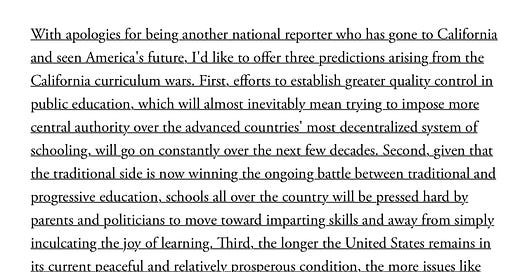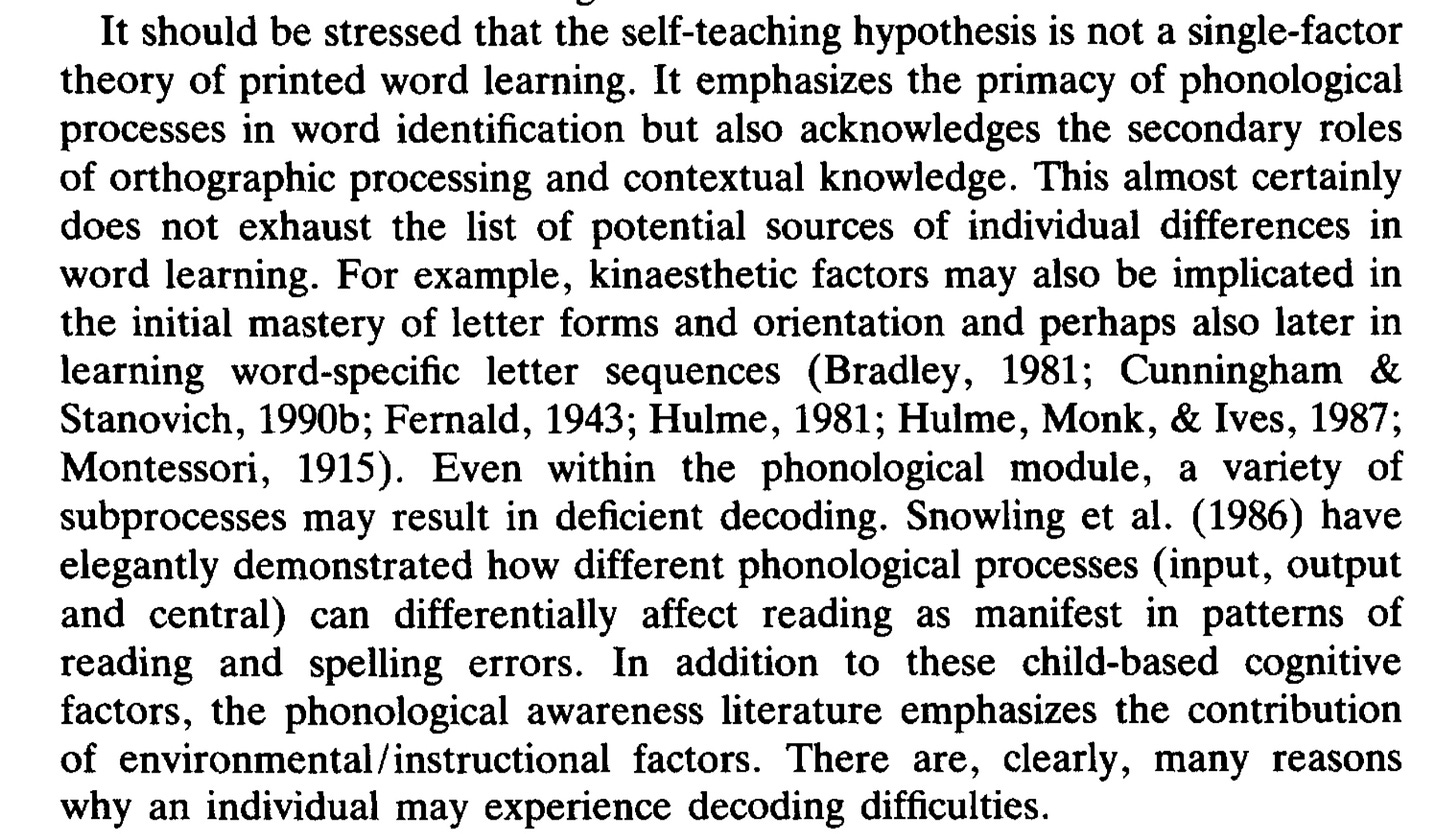The argument the SoR brand of phonics advocates have made since the fall of Whole Language in the mid-1990s has gone well beyond the claim that children benefit from early systematic, explicit instruction in phonics to learn to read. Surely, anyone who has read the National Reading Panel’s (2000) report understands that skill in phonological recoding is essential both to beginning and expert readers and that teachers play an important role in supporting its development.
The distance between the NRP report and the phonics first folks isn’t far but it is significant. Being an essential part isn’t the same as being the single most important part of beginning reading instruction. Such a position implies a disregard for other essential elements, though to be fair phonics first folks do encourage teachers to read aloud to children. Prime classroom time is reserved for teaching phonological recoding in isolation in a sequence from letter name or most frequent sound (science swings either way) to single syllables with a short vowel surrounded by consonants (science has not settled the issue of the order of the vowels), and so on, working up to multi syllable words.
Since the 1990s phonics advocates have gradually occupied larger curricular territory by demanding that phonological recoding must be done before children have space in their classroom for guided reading of natural, not phonetically, regular text—the kind of texts kids would read if they were permitted to read on their own. Dyslexia laws recently passed in a majority of states mandate through curriculum review that all teaching materials comply with SoR. These laws differ from red state to blue state in number and sharpness of teeth, according to a speaker at an SoR event I observed.
This war over reading instruction is an extension of a clash in teaching philosophy that dates back centuries to Noah Webster and Horace Mann, Webster on the side of teaching sounding out words to build a general capacity, Mann on the side of teaching learners to memorize whole words to build a store of images to match up with a printed word. Theorists of orthographic mapping (using patterns of letters recalled as a unit from repeated exposures) all see a strong link between phonological recoding (Webster) and orthographic mapping (Mann), suggesting that readers learn to identify words automatically primarily through autonomous reading of uncontrolled text. Share (1995) calls this phenomenon the “self-teaching hypothesis,” a useful hypothesis from many perspectives on pedagogy.
We know that reading relies on both visual and auditory processing of words; in that sense we know that reading is primarily a language process accessed through two perceptual processes. Scientific research from eye movement studies to magnetic imaging of the brain to random experiments have converged to present a picture of reading as piggybacking on language, taking up residence in the same parts of the brain, tapping into the same stores of structural and semantic capacities, using the same rules of syntax.
But that’s not the issue. The issue is how to begin instruction. Historically, the mythical public we conjure up has been told there are three sides: Phonics, Whole language/whole word, and balanced. Now that balance has been jettisoned as an option, we are back to the future. The choice of the Phonics Proposition comes down to this: Teach children to recode multi syllable words and then let them read OR let them read autonomously while we teach them to recode multi syllable words.
In 1997 Nicholas Lehman writing for the Atlantic1 dug into California’s state of affairs in the aftermath of a complete victory for the phonics forces in the state. He spoke with Bill Honig and Marion Joseph, the political leaders of the phonics force, and after hearing of Bill’s conversion from WL to phonics, of Marion’s outrage over WL, made a bold prediction 25 years ago:
*****
SoR advocates like the Reading League rely on Share’s (1995) self-teaching hypothesis2 as a pillar in their argument for phonics-only reading pedagogy in the early grades. Share (1995) hypothesized that phonological recoding is the only logical explanation for the development of orthographic mapping, i.e., making maps of idiosyncratic spellings in memory. Essentially, early learners must recode print to sound as their eyes track letters in sequence in order to cement letter patterns representing spoken words in orthographic memory, an assertion which has strong appeal to me. Share (1995), however, is not talking about pedagogy. He is talking about reading.
Share (1995) goes to great lengths to emphasize that his thought on phonological recoding of print as the dominant path to orthographic mapping is a self-teaching hypothesis, a logical explanation, not an established fact. In fact, hypothetically, if there is a teacher involved, it’s not the regular classroom teacher. Self-teaching means self-teaching. The following paragraph from the concluding section of the 1995 article seems to soften if not contradict the SoR position. In the first sentence, Share asserts that his hypothesis “…is not a single-factor theory of printed word learning” but instead has “primacy” in the set of sources children rely on. Attend to the final sentence and you will find, unless Share has hardened his position and declared self-teaching a scientific fact, quite a remarkable difference between Share and SoR:
Given the thorough evidence Share (1995) amasses and documents in his paper, it seems reasonable to infer a rich implication for pedagogy: teach phonics. Since there are many reasons for decoding difficulties, it seems counterproductive to enact one prescribed pedagogical approach to the exclusion of others, and instead to provide collaborative structures for teachers to interact and reflect to hone their capacity to respond to the instructional needs of children in differentiated ways. Where am I wrong?
https://www.theatlantic.com/magazine/archive/1997/11/the-reading-wars/376990/
https://d1wqtxts1xzle7.cloudfront.net/53692803/Share_1995_Cognition-libre.pdf?1498677342=&response-content-disposition=inline%3B+filename%3DPhonological_recoding_and_reading_acquis.pdf&Expires=1673811334&Signature=TNCz2~xmozYRg4AGm9LdqGhfWLOdtKfkN88-M1ZehYZyPuJJooJSo7hpuPS02Ay-cSJgnOhf6saS7CG2lxNyzZkD0RKVqA6TS1QaCLIMR9C1vfWAaEVSnx2VpfpnE1aTouU1XDYHQDg9SAsKz5yvoHpEt0kijEdOW1WrUvnZYq8ZWxHwQU2RGXukfXFcXJgzeoD7xXwUV8wHkgU5s9Xaw9uNf-bc3DgE34uEE-hfC0-sOWj9YLIgaxujpAkEFZOpm7UEjZPkQTHtsbgkeEP4dgquPtwLFbrkFhSv5t32afhSGoQizR-HFWrcAAjnAt5dby2g3ZSu1GSSfyzxbl9jLA__&Key-Pair-Id=APKAJLOHF5GGSLRBV4ZA





Indeed it does. Share opens the door to any and all secondary capabilities and resources. If readers restrict their access to information during autonomous reading events, the self-teaching mechanism would likely fail more frequently. Share does not imply that kids should be placed in reading situations designed to restrict their access to all available resources
The silver bullet. You know what bothers me? The assumption that teachers don’t know what they’re doing, that teacher prep programs don’t prepare teachers well, and that teachers welcome scripts and canned lessons. So support them if you think that. Don’t dehumanize them. Take all of the paraphernalia away--the grades, the grading, the credits, the textbooks, the tests, the curriculum, the political pressure. Rewrite the whole system from the ground up with learning in the center of the blueprint--learning for everyone involved--and reboot. Sarason was right. Michael Fullan too. Predictable failure of educational reform is rooted in piecemeal changes by zealots looking for silver bullets.